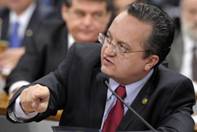The low growth forecast for the Brazilian economy in 2014 may affect the agricultural industry, concluded several participants at the 13th Brazilian Agribusiness Congress, held in São Paulo.
“We had a period of accelerated productivity in the Lula government and a slowdown in Dilma's, but despite the change, there is a trend in the permanent tax burden,” explained Samuel Pessoa, a researcher at the Brazilian Institute of Economics (IBE).
Pessoa attributed the productive slowdown to low investment, and the forecast of growth analysts in the agribusiness sector was 0,6%, a percentage considered low.
Financial market analysts reduced Brazil's growth forecast for 10 for the 2014th consecutive week, which was 0,86%, against the 0,9% projected last week, the Central Bank reported today.
Despite the projection of minimum growth for agroindustry and a reduction in the country's Gross Domestic Product (GDP) this year, the vice president, Michel Temer, highlighted the "success" of the agricultural sector at the same congress.
“Agribusiness is one of the engines of the national economy and a good percentage of GDP, has an extraordinary prestige from the government through subsidized interest and incentives of the most varied”, pointed out Temer.
The vice president denied the criticisms that the credit lines are not reaching the sector and specified that the government makes "loans" with interest reduction and extension of the payment terms of the credit debts.
However, Pessoa stated that it is “common” that the impact on the level of productivity is associated with the dynamics of the international market, but in the case of Brazil, this premise does not fully apply because the economy is “closed” to the price of exports and imports .
After the 2008 crisis, Pessoa added, Brazil went through a period of high prices for raw materials, with a devaluation of the dollar and inflationary instability, factors that oppose a signaling of the dynamics of the international economy as the only one responsible for the “brake” for agribusiness.
According to the analyst, for an increase in productivity, it is necessary “a maturation of institutional public policies” and an increase in the exchange rate, which has fluctuated around R $ 2,25 for each US $ 1.
Without changes, Pessoa believes that the country will undergo a reconfiguration of the inflation scenario, which fluctuates close to the limit of the official target, of 6,5%, and by a “certain exchange control”.
"We have to do an urgent tax reform, Brazil does not have a favorable environment for business and we are by far the worst country in this item", he evaluated.
In this sense, the political analyst Christian Lohbauer, said that before reevaluating the economic policies for the sector, the challenge is to ensure that sectors outside the rural area are attentive and informed about the country's agricultural development.
“Agroindustry is an activity that generates exports, moves and is saving the country's economy”, defended Lohnauer at the event.
Regarding the criticisms of the tax burden and its interference in the agribusiness, Temer admitted the "difficulties" to implement a tax reform in Brazil.
“It is a delicate issue. Tax reform does not go ahead. So the government gave benefits to the country's productive sectors, making a kind of “sliced” reform, which will continue to happen ”, he stressed.
Source: Exame Online Portal





